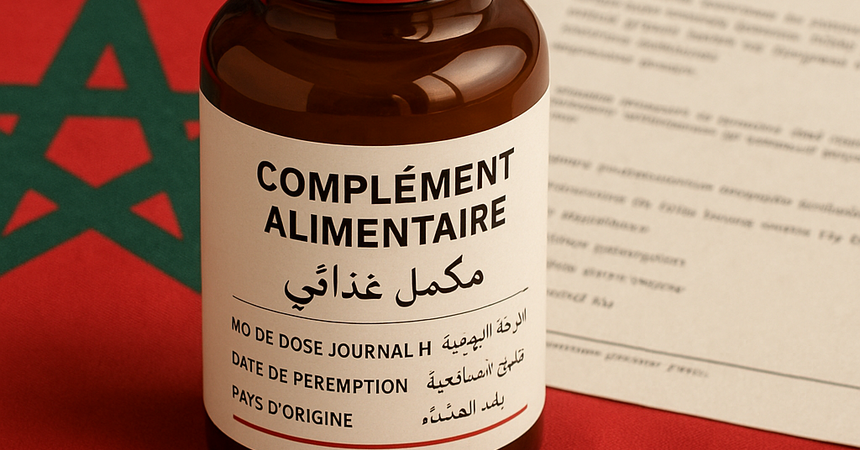The Moroccan market for dietary supplements and nutraceuticals is rapidly growing. Products supporting immunity, joint health, beauty, energy, and digestion are in high demand. However, entering this market requires more than just product registration — strict compliance with composition and labeling requirements is essential. Failure to comply can result in registration denial, customs delays, or even a sales ban.
Here are the key labeling and composition requirements for dietary supplements in Morocco, relevant for 2025.
Labeling: Mandatory Elements
Labeling of dietary supplements in Morocco is primarily regulated by sanitary and customs authorities, particularly ONSSA (National Office for Food Safety).
All products entering the market must include:
1. Product name
- Clear and without medical claims (e.g., "cures", "treats", "prevents")
2. Purpose or category
- For example: complément alimentaire (dietary supplement)
3. Complete ingredient list
- With amounts (mg/g/ml)
5. Dosage form and usage instructions
6. Storage conditions
7. Expiration date
8. Country of origin
9. Manufacturer’s name and address
10. Importer/distributor in Morocco
11. Language
- French (mandatory), Arabic (recommended for retail sales)
- Batch number
- Manufacturing date
- A disclaimer such as “Not a medicinal product” if the product could be confused with one
What Is Prohibited on the Label
- Any medical claims, such as:
- “Treats arthritis”
- “Eliminates insomnia”
- “Lowers blood sugar”
- Images of organs (e.g., heart, joints, brain) — depending on context
- Use of the terms “natural,” “organic,” “halal” — only if certified
Composition Requirements
Moroccan authorities are strict about ingredient safety. Even ingredients allowed in the EU or USA might be restricted or banned in Morocco.Special scrutiny applies to:
- Melatonin — often prohibited for over-the-counter sale
- Caffeine, synephrine, and other stimulating extracts — restricted
- Vitamins and minerals — must stay within Recommended Daily Intake (RDI) limits
- Animal-derived products — require certification, including Halal for mass-market products
Packaging Requirements for Imports
- Labels may be applied locally, but before product release to market
- Packaging must be sealed and tamper-proof
- Stickers/translations must be readable and wear-resistant
How to Avoid Mistakes When Entering the Market
Labeling errors are one of the most common reasons for product rejection or registration refusal. To avoid this, it's best to adapt your packaging in advance and conduct a compliance audit based on Moroccan regulations.WorldWideBridge — Your Guide to the Moroccan Supplement Market
Our team will help you:- Review and adjust your product formulation
- Prepare compliant labels and packaging in line with ONSSA requirements
- Align documentation with distributors and customs
- Obtain approvals and launch your product turnkey in Morocco
